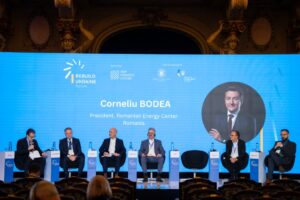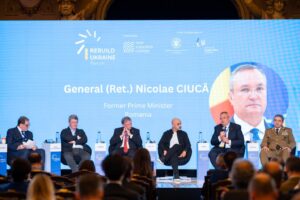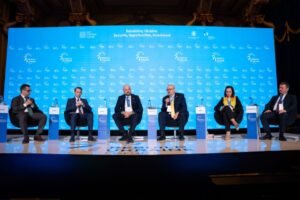
Participants in the Green Reconstruction and Green Energy panel at the Rebuilding Ukraine: Security, Opportunities, Investments forum in the Romanian capital concluded that the modernization and decarbonization of Ukraine’s energy infrastructure must go hand in hand with digitalization, the development of smart cities, and deeper integration into the EU energy space.
The panel was moderated by Corneliu Bodea, president of the Romanian Energy Center, who outlined the need for profound transformations of energy systems to transition to a low-carbon model. The key speaker was Bogdan-Gruia Ivan, Romania’s Minister of Energy, who set the strategic guidelines for the discussion. The discussion was also joined by George Agafitei, Head of Sustainable Development and Institutional Relations at PPC Group; Vitaly Radchenko, Head of Energy and Climate Change Practice at CMS Ukraine; Nicolas Richard, CEO of Engie Romania; Gheorghe Chubotar, President of Electroalfa International; and Eduard Dumitrascu, President of the Romanian Smart City Association.
The speakers noted that urban digitalization and energy modernization projects, in particular smart city initiatives, have become important catalysts for the renewal of local energy systems and municipal infrastructure. They emphasized that Ukraine should not be underestimated in terms of technological solutions: businesses and government agencies are highly receptive to the implementation of digital tools, from artificial intelligence to network infrastructure optimization. “Ukraine has already demonstrated its ability to quickly transition to new digital platforms. This makes it possible to build a modern energy sector rather than a ‘patched-up’ one,” Radchenko noted.
Participants emphasized that Ukraine is undergoing an intensive phase of legislative reforms and convergence with European standards in the fields of energy, ecology, and market regulation. This creates conditions for more effective coordination between central authorities and local levels, as well as for the implementation of joint projects with EU countries, with an emphasis on inter-state interconnectors, network balancing, and strengthening regional energy security. “Aligning rules with European ones is not only a requirement for integration, but also a prerequisite for attracting investors to long-term ‘green’ projects,” Ivan emphasized.
A separate part of the discussion was devoted to rethinking the architecture of energy networks in the direction of decentralization, flexibility, and increasing opportunities for electricity flows between countries. Participants recalled that Ukraine is already working in sync with the European energy system and is increasing the volume of electricity and gas exchanges with EU countries. In their opinion, Ukraine’s “green” transformation requires not only the physical reconstruction of generation and network assets, but also the formation of a new culture of innovation capable of attracting strategic investments and the most advanced technologies.
In this context, cooperation between European and Ukrainian energy and technology ecosystems was described as a fundamental element of regional energy sustainability. Participants called green reconstruction a historic opportunity to form a more sustainable, digitized, and EU-integrated Ukrainian economy. The panel concluded that, despite the challenges, close cooperation and coordinated investment by the state, business, and international partners is the only realistic path to an effective, future-oriented reconstruction of the energy sector.
The forum “Rebuilding Ukraine: Security, Opportunities, Investments” is being held on December 11-12 in Bucharest under the auspices of the Romanian Ministry of Foreign Affairs and the Ukrainian Ministry of Foreign Affairs and is organized by the New Strategy Center. According to the organizers, more than 30 panel discussions and parallel sessions are planned over two days with the participation of representatives of governments, international organizations, the private sector, financial institutions, and experts from Europe, North America, and Asia. The topics of the panels cover security and defense, infrastructure, financing and investment, green energy, digitalization, human capital, and cross-border cooperation.
DIGITALIZATION, energy market, EU, INTEGRATION, RECONSTRUCTION

Insurance company Busin (Kyiv) collected UAH 175.2 million in gross premiums in January-September 2025, which is 9.08% more than in the same period of 2024, according to Standard Rating, which updated the insurer’s credit rating/financial stability rating to “uaAA+” on the national scale based on an analysis of the specified period.
The rating agency’s report notes that revenues from reinsurers increased by 6.05% to UAH 189.1 million, and the ratio between premiums attributable to reinsurers and gross premiums decreased by 3.09 percentage points (pp) to 107.94%.
In the first nine months of 2025, the company paid out UAH 215,000 in insurance payments and reimbursements to its clients, compared to UAH 31.869 million in the same period of 2024. RA notes that significant fluctuations in the volume of business and the level of payments of JSC IC Busin are related to the specifics of its activities and specialization in insurance of large risks, in particular aviation risks.
As of September 1, 2025, the company’s assets decreased by 5.44% to UAH 282.5 million, equity increased by 13.4% to UAH 182.7 million, and cash and cash equivalents decreased by 26.9% to UAH 235.6 million.
RA notes that the financial results of Busin Insurance Company JSC improved significantly in the period under review. In particular, based on the results of the first nine months of 2025, the insurer received significant amounts of operating profit (UAH 34.08 million) and net profit (UAH 24.84 million), while based on the results of the same period in 2024, the insurer’s activities were unprofitable.
Busin Insurance Company was registered in February 1993. It specializes in risk insurance. It is a member of a number of professional and industry associations, including the League of Insurance Organizations of Ukraine, the Insurance Payments Club, the International Association of Aviation Insurers (UA), the Nuclear Insurance Pool, the American Chamber of Commerce in Ukraine, and the British Business Club.

The widespread use of unmanned systems in Russia’s war against Ukraine represents not just a technological evolution, but a profound change in the logic of warfare, for which most European countries are not yet prepared, according to participants in the panel discussion “The Russia–Ukraine Drone War: Innovation on the Front Line and Beyond. What Can We Learn for Our Own Defense?” at the Ukraine Recovery Forum in Bucharest.
Panel VIa was moderated by Greg Melcher, Chief Operating Officer of the New Generation Warfare Centre (USA). The discussion was attended by Andriy Sirko-Galushchenko, an expert in the development of UAVs for military applications; Terry Jamison, International Director of Boeing’s Vertical Takeoff and Landing Aircraft Division; Mustafa Nayem, Director of Public Communications at GTX; former Prime Minister of Romania, retired General Nicolae Ciucă, and Deputy Chief of Staff for Operations and Training, Lieutenant General Julian Berdila.
According to the speakers, what until recently was perceived as a “distant technological horizon” has already become an everyday operational reality. The development of unmanned systems, open architectures, and the rapid integration of new capabilities indicate that the “future of warfare” has arrived much sooner than many Western players expected. Ukraine’s combat experience has shown that accelerated innovation cycles are leading to a structural transformation in the planning of air, ground, and joint operations.
Participants emphasized that the combined use of manned and unmanned platforms, as well as immediate technical interoperability between them, are becoming a basic requirement for the adaptation of modern armed forces. Drones are already being used systematically for reconnaissance, high-precision strikes, logistics, mining and demining, artillery fire correction, and special operations support. Massive coordinated attacks on critical infrastructure have demonstrated the limitations of purely reactive defense and highlighted the need to neutralize threats “at the source.”
At the same time, counter-drone systems are rapidly developing, combining existing surveillance and electronic warfare capabilities with new solutions to counter large numbers of small, low-altitude targets. “This is no longer an episodic tool, but a full-fledged layer of the modern battlefield that requires a separate doctrine, forces, and means,” Berdila noted.
A separate emphasis in the discussion was placed on Europe’s vulnerability to hybrid forms of aggression. According to experts, traditional threat assessments do not correspond to the realities in which the enemy acts mainly with asymmetric, scattered, and difficult-to-attribute methods. Incidents involving the appearance of unknown drones near critical infrastructure in various European countries, they said, expose the gap between public perception, the level of institutional preparedness, and the actual nature of the risks.
Following the discussion, the participants concluded that “drone” warfare is not only a technical issue but also a challenge for institutional capacity and defense planning. Adapting to the new operational environment requires flexible institutions, short innovation cycles, coordinated investments, and a doctrine capable of quickly integrating the lessons learned from Ukraine’s experience. Modern warfare, they emphasized, has become a space where speed of adaptation, integration of systems, and simultaneous readiness for offensive and defensive actions are key elements of strategic resilience.
The forum “Rebuilding Ukraine: Security, Opportunities, Investments” is being held on December 11-12 in Bucharest under the auspices of the Romanian Ministry of Foreign Affairs and the Ukrainian Ministry of Foreign Affairs and organized by the New Strategy Center. According to the organizers, more than 30 panel discussions and parallel sessions are planned over two days with the participation of representatives of governments, international organizations, the private sector, financial institutions, and experts from Europe, North America, and Asia. The topics of the panels cover security and defense, infrastructure, financing and investment, green energy, digitalization, human capital, and cross-border cooperation.

For the first time in 2025, a separate annual quota for the supply of 30,000 tons of Ukrainian flour to the European Union has been granted, which opens up opportunities for long-term planning for the domestic flour milling business, said Rodion Rybchinsky, director of the Ukrainian Flour Millers Association.
“The top 10 export-oriented companies have already invested around EUR 17 million in modernization and now understand that these investments will have prospects,” he said at the “Agribusiness in Ukraine” conference in Kyiv on Thursday.
He recalled that until 2022, flour was exported within the joint quota with wheat. Flour millers usually did not have time to deliver their products to the EU, as grain traders were the first to choose the quota. Only after the opening of trade preferences in 2022 did Ukrainian flour begin to actively enter the EU market, and in 2023, flour exports to EU countries amounted to 73,000 tons.
“These volumes became an argument in the negotiations: if 73,000 tons were successfully delivered to the EU, the question of Ukrainian flour’s non-compliance with European quality requirements would be moot,” said Rybchynskyi.
According to him, Ukrainian flour is now available in Germany, the Czech Republic, Spain, and Italy, which is clear proof of the high quality of Ukrainian products.
Rybchynskyi noted that during the 11 months of 2025, Ukraine supplied 26,000 tons of this product to the EU, so by the end of the year, domestic producers will be able to fully use the quota. At the same time, the biggest problem for flour millers in 2026, if we assess the prospects of the industry, will be the labor shortage.
He named the European Millers’ Congress in France as one of the most anticipated events in the industry next year, during which the Ukrainian side will try to find arguments and establish contact, in particular, with the Romanian Association of Flour Producers, as well as try to lay the groundwork for a review of quotas in 2028. According to Rybchynsky’s estimates, Ukraine is capable of supplying 300,000 tons of flour to the EU market.

At the Rebuilding Ukraine: Security, Opportunities, Investments forum in Bucharest, during one of the panel discussions, representatives of Romania, the Republic of Moldova, and Ukraine announced their intention to deepen regional cooperation in infrastructure within the “strategic transport triangle” to support Ukraine’s reconstruction and strengthen the region’s resilience.
The panel was moderated by George Scutaru, CEO of the New Strategy Center think tank. Participants included Vladimir Bolea, Deputy Prime Minister and Minister of Infrastructure and Regional Development of the Republic of Moldova; Mihai Iurca, Special Envoy for the Reconstruction of Ukraine and Head of the Office of the Prime Minister of Romania; First Deputy Chair of the Verkhovna Rada Committee on Transport and Infrastructure Yulia Sirko, State Secretary of the Ministry of Infrastructure of Romania Ionel Scrieşteanu, Deputy Minister of Communities, Territories and Infrastructure of Ukraine Serhiy Derkach (via videoconference), and CEO of Leviatan Group Cătălin Podaru.
The discussion focused on the strategic importance of regionalizing infrastructure projects between the three countries and developing logistics corridors that ensure not only economic and demographic mobility, but also military mobility in the context of the ongoing war. The participants emphasized that transport and energy connectivity is seen as a tool for coordinating government policies, as well as a platform for involving the private sector in the reconstruction of Ukraine.
“Logistics is becoming a key element of security and development: from ports and railways to border infrastructure, all of this must function as a single network between Romania, Moldova, and Ukraine,” Skutaru noted during the discussion. He stressed that coordinating investments and projects within the “strategic transport triangle” is a necessary condition for increasing the capacity of corridors used for trade, transit, and military aid.
Representatives of the Ukrainian and Moldovan sides stressed that the reconstruction of Ukraine is impossible without the active participation of private business and the involvement of international companies in joint projects. “Ukraine is open to partnership, and we need both financial resources and technological solutions that can be provided by regional and global partners. Joint infrastructure projects strengthen not only the economy but also the stability of the entire region,” emphasized Deputy Minister Serhiy Derkach.
Following the discussion, participants noted positive dynamics in strengthening connectivity between the three countries, particularly with regard to the modernization of transport corridors, port, and border infrastructure. They concluded that further progress will depend on coordinated government action, effective use of financial instruments, and close cooperation with international partners to enhance the collective resilience and prosperity of the region.
The forum “Rebuilding Ukraine: Security, Opportunities, Investments” is being held on December 11-12 in Bucharest under the auspices of the Romanian Ministry of Foreign Affairs and the Ukrainian Ministry of Foreign Affairs and organized by the New Strategy Center. According to the organizers, more than 30 panel discussions and parallel sessions are planned over two days with the participation of representatives of governments, international organizations, the private sector, financial institutions, and experts from Europe, North America, and Asia. The topics of the panels cover security and defense, infrastructure, financing and investment, green energy, digitalization, human capital, and cross-border cooperation.

Ukrainian sugar in 2025 turned out to be a very bitter topic and a sore point in negotiations on trade in agricultural products with the European Union. The industry’s plans for 2026 are to increase the share of Ukrainian sugar on the European market, said Yana Kavushevska, head of the National Association of Sugar Producers of Ukraine “Ukrtsukor,” Yana Kavushevska at the conference “Agribusiness in Ukraine” in Kyiv on Thursday.
She noted that during the preparation of the updated trade agreement, the Ukrainian side was not prepared to deal with the powerful sugar lobby and its stakeholders in the EU, along with their strong support at the political level.
Another surprise was the European community’s bias against Ukrainian agricultural products. Among the most absurd myths, Kavushevska named the inexhaustible potential of the Ukrainian agricultural sector, the dominance of agricultural oligarchs, etc. Both Ukrainian agricultural associations and government officials had to refute these myths.
“One of the areas of our communication was to explain to Europeans that the Ukrainian sugar industry is a continuation of the European one. We use all the inputs that we purchase in the European Union in our work. (…) For every hectare of sugar beet, we purchase approximately $1,000 worth of goods in the EU. Accordingly, this year we have 200,000 hectares of sugar beet in Ukraine, for which we have purchased $200 million worth of products from the EU,” said the head of Ukrtsukor, adding that such arguments either surprise or are ignored by her European colleagues.
Speaking about the quotas that Ukraine received for sugar supplies to the EU under the updated trade agreement, Kavushevska noted that they had increased fivefold compared to the previous ones.
“Indeed, the results we have achieved with the quota received in the European Union for sugar show a fivefold increase — from 20,000 tons to 100,000 tons. Is this a lot or a little? Probably no one could be satisfied. But I am sure that if there had been no effective agricultural and social communication, this quota could have been smaller,” said the head of Ukrtsukor.
She stressed that the EU likes predictability, balance, and foreseeability. This is how she explained the need for Ukraine to introduce internal licensing for sugar exports to the European Union. In her opinion, this mechanism will allow Ukrainian sugar producers to eventually become not just technical suppliers of products to the EU, but gradually transform into full-fledged members of the European market.
“Yes, it costs producers who want to export additional expenses for obtaining documents, complications, and delays in possible deliveries. But this (internal quotas – IF-U) is what demonstrates to Europeans that we know how to work and regulate the market,” the expert explained.
Kavushevska named another complication of the updated trade agreement for sugar producers as the European Union’s application of the concept of a “critical quota” to Ukrainian sugar. It provides for the importer to deposit financial guarantees into special accounts, which will be returned to them 3-30 days after customs clearance of goods received from Ukraine. According to the expert, this mechanism is one of the ways to prevent the uncontrolled spread of Ukrainian sugar in the EU. At the same time, it is an unpleasant moment for European buyers, who have to freeze their own working capital for a certain period.
Speaking about the sugar producers’ plans for 2026, the head of the association said that the industry will continue to establish contacts with the European sugar industry and hopes that licensing will continue as an export mechanism. In addition, benchmarks will be developed for key production indicators so that the industry can prepare for integration into the European market.
“For Ukrainian sugar producers, the European market is virtually the only option. We cannot compete for Africa because Brazil will always dominate there logistically. Our task is to gain a foothold in Europe, increase Ukraine’s share as much as possible, and eventually ensure the European Union’s self-sufficiency in sugar,” Kavushevska concluded.